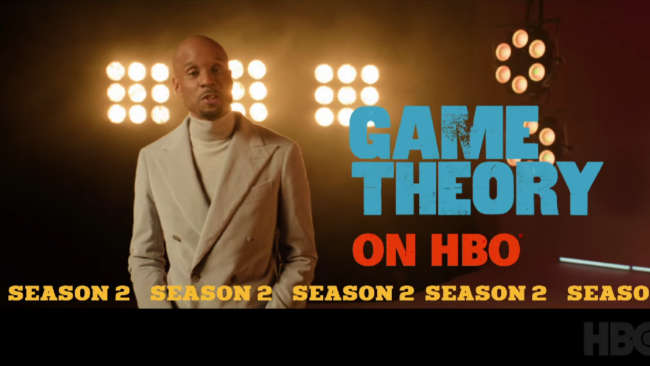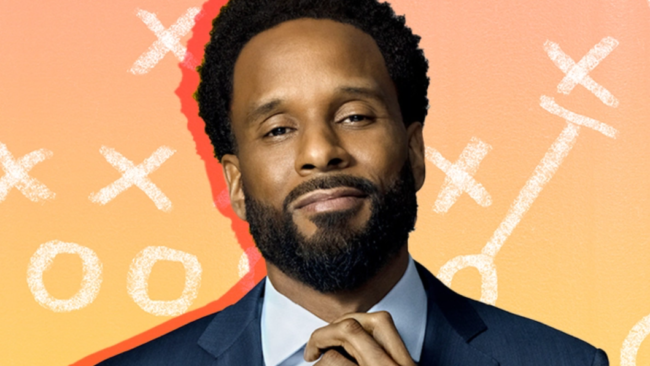Business…here’s Monday’s Jump.
Watched Clarence Thomas’ interview on “60 Minutes” last night. I found it to be pretty interesting. It’s hard to tell how sincere he was being, but no one has less reason to be insincere than a Supreme Court justice. Foe Life!
It was interesting to hear him say how frustrated he is by racism, how he was a radical back in the day, and all that fun stuff. Of course, it’s interesting since those facts would seem to indicate a certain level of nationalism. Clarence Thomas, however, has no nationalist sensibilities. Not a single one.
He doesn’t see himself as a black man. That one’s interesting. Really, that’s how things should be. We should be able to see ourselves as people, without chromatic modifiers preceding that. But the truth is, we can’t. We are black. If we weren’t made lack by the invention of an absurd social construct, we wouldn’t have the problems we have not just trying to make it from one day to the next. So Clarence, see yourself as you’d like, but you better be honest about this. You’re black. You have your job because you’re black (c’mon Clarence, there have been two black justices on the court, and one replaced the other, and there probably won’t be another until your time on the bench is up). That’s what it is.
The lack of nationalism struck me, though, because I found it to be so cold and dispassionate. It didn’t sound like Clarence was cold and dispassionate. He seemed to be pretty fiery inside. But when it comes to black people, he’s totally disinterested. He hates racism, but he doesn’t give a damn about its fellow victims. He could care less. He thinks, somehow, that he has transcended race.
But if it were that easy, a lot more of us would have done it. That time hasn’t come for you, Clarence. It didn’t come when you latched on with John Danforth. It didn’t come when you crippled the EEOC. It didn’t come when you got the call from Bush the Elder. You are one of us.
Yet, you have no concern for us. You hate racism, but choose not to do anything about it. You claim the Constitution should dictate the law, but that ignores that the Constitution’s practical applications, using that logic, do not fulfill its spirit.
So forgive me if I reject the notion that Clarence Thomas is a man of principle. He’s not. He found a way to use racism to his advantage and creative a nice life for himself. That’s the game, I suppose. I loathe it, but we all survive in different ways.
But don’t sit in that chair and tell me hwo much you hate racism and like to help the disadvantaged while doing little to nothing on their behalf.
But I’ll say this–I no longer think Clarence Thomas hates black people. He just doesn’t give a damn about us.
And that’s scarier than what I thought before.
19 thoughts on “Clarence”
Leave a Comment
You must be logged in to post a comment.





You can’t feel anything but pity for Clarence. It’s clear that life in America got off in his head so strong that he wasn’t able to develop a sense of pride in being a Black man. That means that he’ll never be at peace with himself or comfortable in his own Black skin. Very sad.
Thomas is a nationalist in the traditional sense. He identifies with formal American institutions, power, and ideals. There’s nothing necessarily wrong with that.
You don’t have to be trained to see that he is the poster boy for the psychological damage that race and racism can do to a human being. It’s been said before, but I truly believe that he’s a tragic figure.
His guilt and insecurity about his tokenism has caused him to lash out at the black people who betrayed him and destroy the causes they back. Yet even he knows that this won’t free him from the immense burden of his blackness. You can see it in his eyes: he’s a defeated man.
First and foremost, I don’t like white people. I don’t like they way they try to give me dap at the job. I don’t like the way they get to drink beer in public after the Braves game and none of them ever go to jail. I don’t like the way they wear Polo shirts with khakis…etc…etc
But you know what I really hate, alcoholics and crackheads. They’re the only people still complaining about race relations in America; the rest of us “good negroes” went out and found jobs a long time age.
And about Clarence Thomas…didn’t he put a public hair in somebody’s coke???
spell check “public” on that last comment and make the appropriate adjustment
I also hate white people. I believe your critique of Justice Thomas is misguided. He is, first and foremost, a man of the law. I would be happy to discuss the myriad reasons why the EEOC was a fraud, but to accuse the man of not caring for black people because he interprets the social contract the two of you interpret the social contract differently seems insincere. The man has a difference of opinion. Lastly African American men currently are appropriately (per demographics) only slightly under represented on the supreme court. The groups that really have a gripe here are women and hispanics.
also I am white
ced125 and max davis:
So you hate white people, mainly because you think they are wrongly advantaged in society. These people, who don’t even know you, you hate presumably for reasons that they themselves have direct control over (the white race doesn’t arrest you for drinking after a braves game, perhaps a white man, but a white man acting under a racist premise should not reflect back upon his race as whole no more than a black man’s crimes and sins should reflect back upon his race).
This line of thinking causes two problems:
1, Hating them for the color of their skin because you believe they hate you because of the color of your skin only makes you look hypocritical and ignorant. It will get you nowhere and it solves none of the underlying problems that are caused by racism.
2, This type of hate only creates a cycle of racism that again, solves nothing. It only incites more racism.
I’m all for discussions about race, and its good to start out by stating your prejudices (think Tim Hardaway), but seriously stop and think about how far ‘hating white people’ will get you and, in turn, the black community.
*that they themselves have NO direct control over….
sorry for the typo/omission
I would disagree. Thomas clearly suffers from an intense self-hatred and frustration that he exists as a black man in america. He truly desires to transcend this notion of race. His response to his inability to do so is an intense and fiery anger and a sense of worthlessness and inferiority. The man says he believes his Yale Law degree to be devalued because his admission to the school was helped by his ethnicity. This is a man who devlaues a real accomplishment that set him on the path to sit on the highest court in our country. There is something profoundly wrong there. Also, if you look at his opinions and read commentary from other justices, such as, Scalia, they even say that Thomas is over the edge. Clarence Thomas would knock down the New Deal as unconstitutional. And no matter how much he rails against racism or prejudice, he cannot get over the true fact that he got where he is today because of the pioneering efforts of individuals and organizations that he now criticizes and works to dismantle their good work. There is no excuse for that.
ok silly folk. I don’t hate white people. I just hate people with light skin.
also clarence thomas makes a valid point. While this is becoming gradually less true (as it becomes less frequent) Clarence Thomas, a black man with a yale degree is seen as less capable than a white man with a yale degree. This largely (albeit not entirely some people are legitimately racist) is less of an accomplishment because his admission standards were lower. There is no way around the fact that forcing quotas based on race on universities lead to a perception if not a reality of a weaker black graduate. It’s quite a stretch to say that him believing imposed quotas make him ashamed of his blackness. He just says that the imposed quotas are wrong, and that his road was tougher because he was a qualified applicant who was unfairly characterized as an equal opportunity admission. Nothing equal about equal opportunity admissions.
Is there any credit for a black man genuinely not knowing any better?
Cause you gotta believe that if he did, he truly wouldn’t be able to sleep at night.
Max,
Why, for instance, doesn’t our society view legacy students or students from welathy families as less capable graduates? Legacy admissions give white students an unfair advantage over students of color given the history of university segregation.
Tons of admissions factors have nothing to do with academics, and many of them are either race neutral or privilege white students. Why attach the “tainted” label to one particular consideration? What’s so pernicious about THIS form of affirmative action vis à vis the others?
Viewing black beneficiaries of affirmative action as “tainted” says more about your biases than it does about the ability of the beneficiary.
eauhellzgnaw nails a valid point and simultaneously devalues max davis’ post. legacy admissions are far more tainted in my view than admissinons based on race or ehnicity. Students of color have to work twice as hard to prove they belong and most legacy students know that they only have to do a passable job an the alumni will take care of the rest. How is Clarence Thomas’ Yale degree seen as less capable than George W. Bush’s? Even Thomas’ most strident critics will admit that he is a capable lawyer and judge. What exactly is Bush capable of? Ivy League universities in particular are notorious for such legacy admissions.
Thomas goes beyond a simple dislike of quotas. I am not a huge fan of quotas but I recognize their use, and yes, continued necessity. But I do not devalue my or any other person of color’s degree because all affirmative action does is get your foot in your door. Once in school, it’s sink or swim. And I have had enough experience and have talked with enough people who have had to contend with the racist expectations of professors and fellow students to realize that getting into the schoolhouse door is the least stressful part of the process. It is telling that Thomas turns his resentment on himself and not on the system that creates the unfair and racist system. Why not attack the racists out there who would belittle a qualified and proven academic because they believe he was not qualified for a position. The very assumption of non-qualification is a racist one.
This is really much simpler than people are making it sound. White people, in many cases, would have you believe that they are color blind and like everyone the same. Black people, in many cases, would have you believe that white people are biased against non-white people. The degree of the bias may differ, but its there. Both of these views are wrong.
The truth is, white people hate everybody, especially other white people. It’s not personal, most of the time. I don’t think. Probably. Maybe.
But just as being part of a minority makes some people band together, being part of a majority makes some people want to split apart. If you’re 1 of 10, there’s strength in numbers. If you’re 1 of 100,000, there’s anonymity and obscurity in numbers. So, for white people, everything is a pissing contest, and no one is to be trusted.
That’s a bit of an exaggeration, but not by far. So, what have we learned? Clarence Thomas is white. I have all the answers, y’all just have to ask the questions.
great post bomani. Can’t say I feel much sympathy for Clarence Thomas. After Anita Hill, it was pretty much downhill from there.
ok yes legacy admissions are a factor. Except everyone knows these people are legacy admissions. Part of being a legacy admission is that you already have a huge and extremely valuable network of people looking to help you. They are devalued for their legacy status, but their outside of school connections typically more than make up for this. Clarence Thomas did not have this outside network, but still suffered the normal devaluation that any student who does not meet full university standards must suffer from.
Way to evade, Max.
You initially argued that affirmative action produced the perception (and perhaps the reality) of lower quality black graduates. What does the fact that legacy students have a professional network to overcome the stigma of lower admissions standards have to do with your original point?
And you’ve never addressed the question of why all black graduates should bear this stigma, while the same isn’t true for all white students or students at large, who also have access to affirmative action.